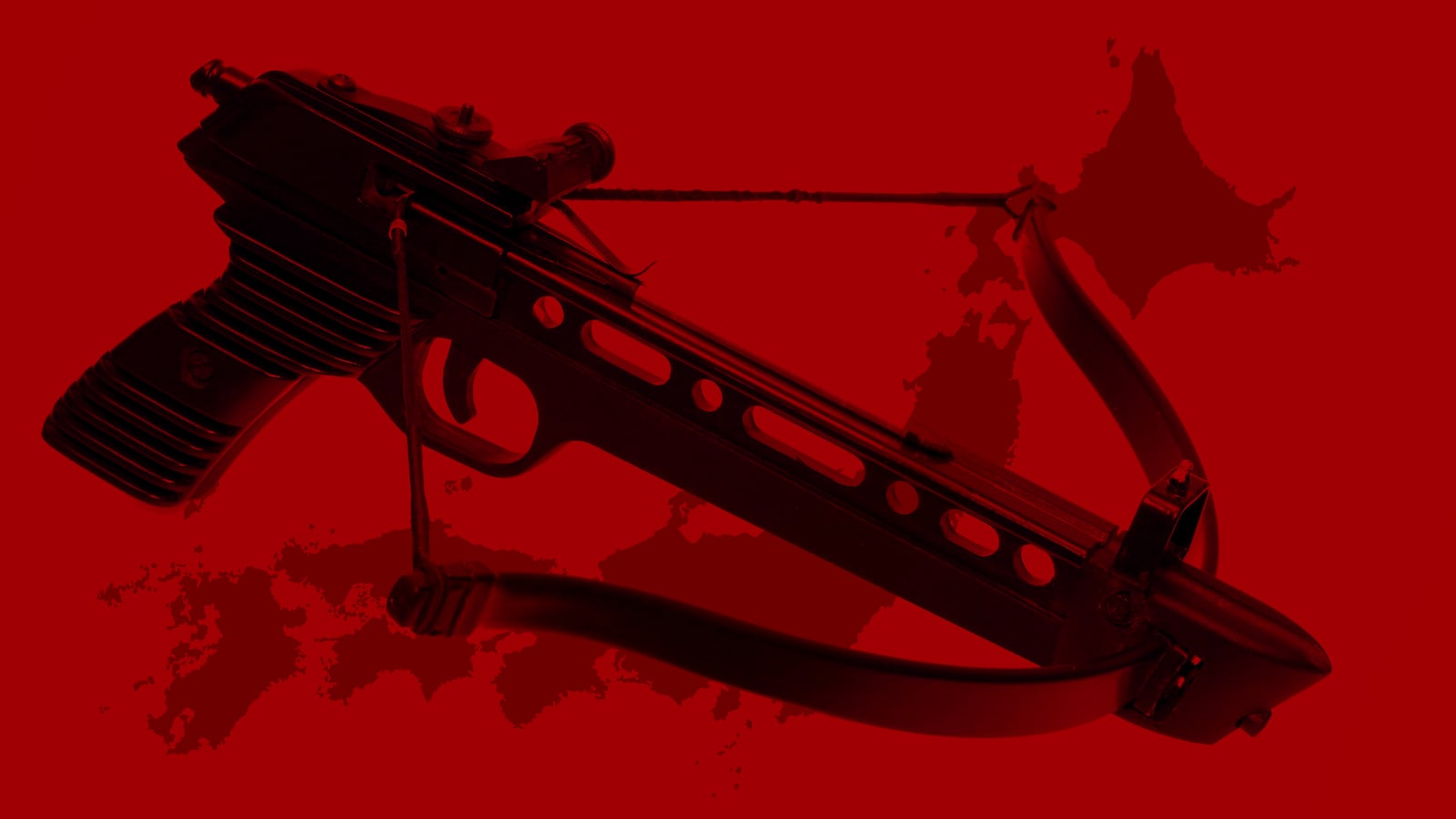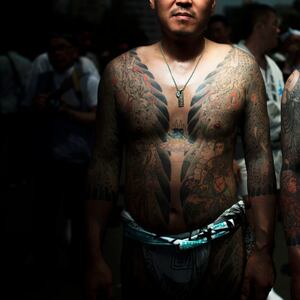TOKYO—It’s been said that if you outlaw guns, only outlaws will have guns—but that’s not true in Japan, which has some of the strictest laws on the books forbidding the possession of guns, and imposes even harsher penalties for using them. If you fire a gun at someone here, you’re likely to spend more than 20 years in jail. The severe penalties even deter the yakuza, Japan’s organized crime syndicates, from using firearms. In 2017, there were only three people killed by gunshots in the entire nation.
But human beings will always find ways to kill each other and, as it turns out, when you outlaw guns in Japan outlaws will resort to other deadly weapons—like crossbows.
Thwack.
Now, the Japanese government is considering banning most people from buying, selling, or owning these semi-automatic bow and arrows. After a series of horrific crimes using the weapons there are now pending revisions to Japan’s laws which will limit their usage to sports and tranquilizing animals. The new revisions are expected to be passed in the current session of the parliament.
The new laws will be retroactive, so those outlaws out there who were planning malfeasance with their handy crossbows are going to have to turn them in to authorities, or get a permit, or face jail-time. If you were planning to take a shot at being a real-life (homicidal) Green Arrow—think twice. The penalties for using it as a weapon are likely to be severe. However, if you’re using a crossbow for a legitimate purpose—like crossbow shooting—you’ll be allowed to keep it, if you are granted a permit.
There have been several grisly murders over the last decade that provided the impetus to crack down on the handling of these potential weapons. According to Japan’s National Police Agency, in the last 10 years there have been 32 cases of crossbows being used in crimes, with six people killed and 11 people injured.
Of these murders, the most horrific was a familicide that left three people dead and one person in critical condition.
Last summer, Hideaki Nozu, a troubled 23-year-old living in Takarazuka City in western Japan, reportedly purchased a crossbow and used it to shoot his entire family. According to reports in Sankei Newspaper and other Japanese media, he went on a murderous rampage on the morning of June 4, shooting his younger brother twice in the bathroom at point-blank range, his mother in the living room, and his 75-year-old grandmother in her bedroom.
Each shot was fired to the head and pierced the skull. Later that day, he summoned his aunt to the house. When she arrived and opened the door, he shot her in the neck at the entrance. She ran out of the house with the arrow still lodged in her neck and called for help. Having successfully removed one of the arrows, his younger brother was still breathing when police arrived, but died at a hospital seven hours later.
During a period of self-imposed isolation and possible mental illness, Nozu had reportedly blamed his family for all his troubles, including having to drop out of college because he was unable to pay for tuition. He was indicted on murder and attempted murder charges and reportedly told police that—with the objective of killing his entire family—he had practiced with the crossbow several times at home before putting his plan into action.
The crossbow killings unleashed a volley of copy-cat crimes. One incident, which occurred on July 26, prompted Hyogo Prefecture to make an ordinance restricting the sales and ownership of crossbows. It involved an unemployed housewife who shot her husband with a crossbow while he was sleeping. Luckily for the husband, the arrow only grazed his head, and he woke up before his wife could finish the job by attempting to slit his throat with a kitchen knife. The crossbow-bearer told police investigators that after losing her job and being trapped at home because of the pandemic she had become increasingly irritable. She had heard of the murders committed in June of that month and decided to purchase her own crossbow to use on her husband.
The following month there was another incident: a 28-year-old unemployed woman used a crossbow to shoot an elderly social worker, piercing his right arm. Fortunately, he lived, and the assailant was arrested for attempted murder.
Under the pending laws, crossbows—which are usually referred to as “bow guns” or “Western bow and arrows” in Japan, though they’re officially called crossbows in parliament—will be strictly defined as a bow that uses a locking mechanism to hold down the string after it has been drawn, and can release an arrow with enough force to harm a living human being.
Nine months after the anti-crossbow bill becomes law, citizens who want to get their hands on the weapons will have to get permission from the local public safety commission and keep the bows locked away when not in use. Crossbow use will only be allowed at firing ranges and other special venues. Recently released ex-convicts, drug addicts, and those under the ge of 18 will not be allowed to own crossbows.
Illegal possession of a crossbow can be punished with a prison term of up to three years or a fine of up to 500,000 yen (about $5,000). Restrictions on the buying and selling of crossbows are being fine-tuned as the bill heads towards finalization, but crossbow dealers who do not do proper background checks or fail to confirm whether the buyer is licensed, will face up to six months in jail or a fine of up to $2,000.
If there was a National Crossbow Association in Japan, they would be fuming. The Daily Beast did ask the National Bowgun Shooting Association for comment on the pending law but as of press time they had not responded.







